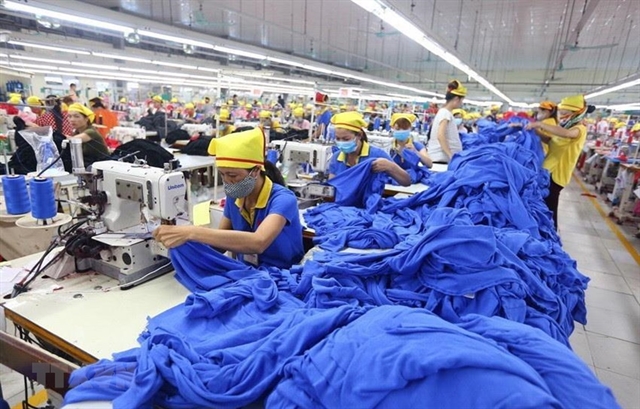The reopening of international flights to Viet Nam after more than one year of closure, coupled with the country’s bright prospect for economic recovery, will help accelerate the inflow of foreign direct investment (FDI).

The reopening of international flights to Viet Nam after more than one year of closure, coupled with the country’s bright prospect for economic recovery, will help accelerate the inflow of foreign direct investment (FDI).
Nearly US$5 billion worth of FDI was poured into the country in the first two months of this year, equivalent to 91.5 per cent against the same period last year, a positive signal considering how the pandemic heavily affected the entire economy.
Phan Huu Thang, former Director of the Ministry of Planning and Investment's Foreign Investment Agency, said that FDI companies managed to cope with the impact of the pandemic and maintain investment in Viet Nam thanks to their resilience and solid foundation.
Besides, the Government's efforts to control the pandemic and maintain macroeconomic stability have reassured the FDI community and helped draw investment flow into the country.
Notably, the disbursed FDI totalled $2.68 billion in the first two months of this year, representing a rise of 7.2 per cent against the same period last year, Thang said, adding that this reflected foreign investor confidence in Viet Nam’s investment environment.
EuroCham Vice-Chairman Nguyen Hai Minh said that many foreign investors saw Viet Nam as an attractive destination, with many deciding to invest in the country even in the context of the pandemic.
For example, Danish toymaker Lego in December last year decided to invest more than $1 billion in a new toy factory in Viet Nam’s Binh Duong Province.
Minh said that many companies who wished to shift their production to Viet Nam had been waiting for the reopening to foreign investors to travel to the country to study investment opportunities.
According to Nguyen Van Toan, Deputy President of the Viet Nam’s Association of Foreign Invested Enterprises, the success in fighting the virus, especially with the national vaccination campaign, together with several free trade agreements including the Comprehensive and Progressive Trans-Pacific Partnership and the EU-Viet Nam Free Trade Agreement made Viet Nam attractive for foreign investment.
Toan said that attracting $40 billion FDI this year was feasible.
Many experts believed that implementing Resolution No 128/NQ-CP about safe adaptation to the COVID-19 pandemic would promote the recovery of businesses and the economy, so foreign investors would be confident in investing in Viet Nam.
The FDI inflow was expected to soar rapidly when economic activities were reopened in the coming months.
Nguyen Anh Duong from the Viet Nam Chamber of Commerce and Industry said that the post-pandemic economic recovery prospects were bringing significant opportunities for Viet Nam to attract FDI.
However, it is essential to consolidate the confidence of the foreign investors in the administrative management and the enforcement of the international integration commitments, including tackling bottlenecks in labour, administrative procedures and regulation inconsistencies, Duong said.
Matthew Powell, director of Savills Ha Noi, said that several reputable investors choosing Viet Nam as a strategic destination were important in promoting FDI growth.
Currently, enterprises were trying to expand and diversify markets so as not to depend on a single market, he said, adding Viet Nam was emerging as an attractive investment destination, given its political stability. However, there were limitations, such as administrative procedures, that needed to be improved to attract investors.
Minister of Planning and Investment Nguyen Chi Dung said that FDI continued to be an important capital flow for Viet Nam’s economic growth and international integration.
He said that the competition among countries in attracting FDI was growing increasingly harsh as countries focused on attracting external resources to recover the economy in the context of limited capital supply.
The focus would be placed on reviewing foreign investment policies to ensure appropriateness with the global economic development and changes in the strategies to attract FDI of countries worldwide, he said. Creating a healthy business environment would also be an important factor.
He said speeding up the necessary process to bring social and economic activities back to normal and eliminate the disruptions in the supply chain of goods and labour would also help strengthen investor confidence.
He added that the Government needed to develop regulations and standards as a new filter to select capable foreign investors with advanced, environmentally friendly technologies for sustainable development.
In addition, Viet Nam must focus on developing human resources to meet the demand of foreign investors in the context of Industry 4.0.
Viet Nam attracted $31.15 billion FDI in 2021, up 9.2 per cent over the same period last year. — VNS
- Tags
- international flights
- FDI





